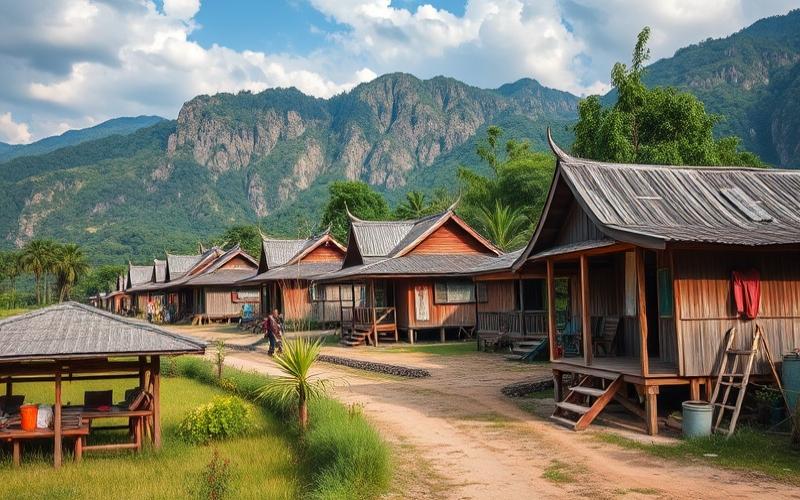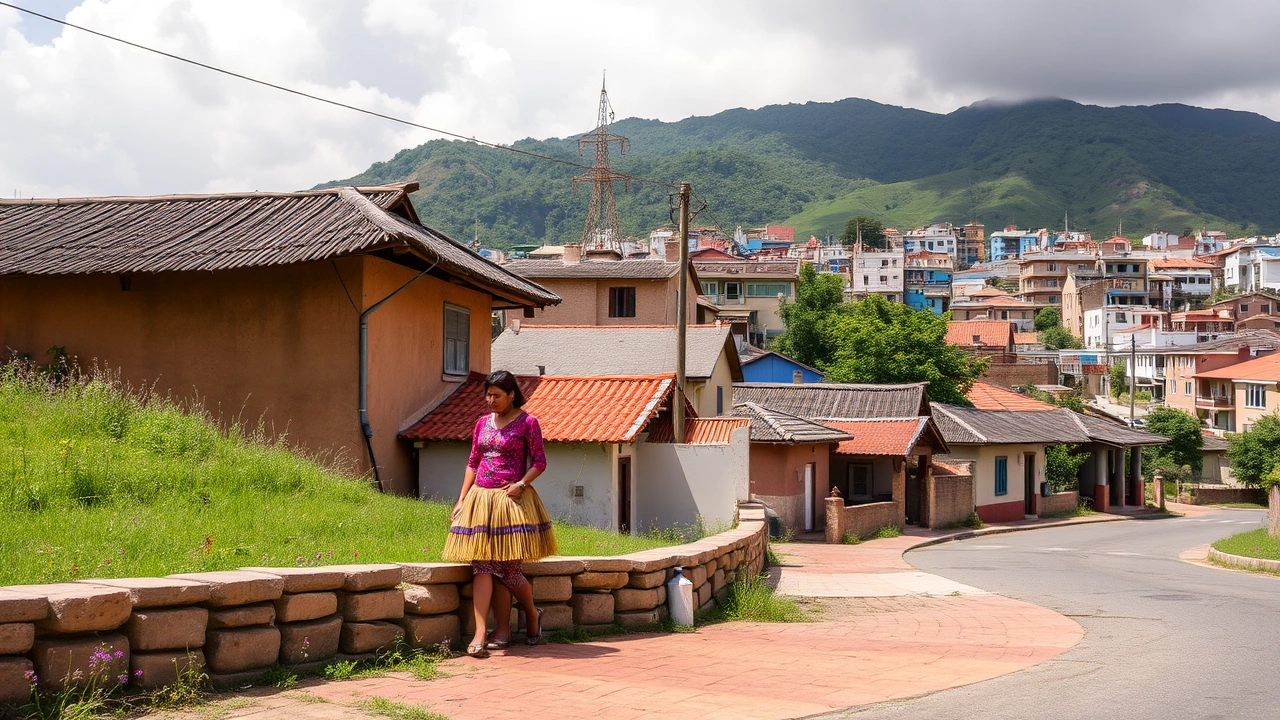
 Published on and written by Cyril Jarnias
Published on and written by Cyril Jarnias
Thailand, with its pristine sandy beaches, rich culture, and affordable cost of living, is increasingly attracting foreign investors to its real estate sector. Whether you’re an expatriate seeking to generate additional income or an international investor looking for lucrative opportunities, long-term property rental in Thailand can prove to be a highly profitable venture. However, navigating the legal and cultural intricacies of the Thai real estate market may seem daunting at first. Don’t worry! This article will guide you through the essential steps to succeed in your long-term rental project in Thailand.
The Long-Term Rental Market in Thailand: A Golden Opportunity for Savvy Investors
The Thai real estate market offers numerous opportunities for foreign investors. The demand for long-term rentals is constantly increasing, particularly in major cities like Bangkok, Phuket, or Chiang Mai. This trend is explained by several factors:
- The growing influx of expatriates and digital nomads seeking housing for extended periods
- The development of long-term tourism, with travelers wishing to immerse themselves in the local culture
- The country’s economic boom, attracting more and more foreign companies and their employees
These elements create a favorable environment for rental property investment, offering prospects of attractive returns for well-informed owners.
However, before embarking on this adventure, it’s crucial to understand the specificities of the Thai market. The legislation concerning real estate ownership for foreigners is complex and restrictive. Indeed, non-Thai nationals cannot directly own land, but can acquire apartments in condominiums, provided that foreign ownership does not exceed 49% of the building’s total area.
Despite these restrictions, many options are available to foreign investors to benefit from the Thai rental market. Among the most common solutions are:
- Purchasing a condominium apartment
- Creating a Thai company to purchase a property
- Long-term leasing of a property (up to 30 years) to sublet it later
Each option has its advantages and disadvantages, and it’s recommended to consult a lawyer specialized in Thai real estate law before making a decision.
Good to know:
Although restrictions on land ownership may seem constraining, they do not prevent foreign investors from making substantial profits in the Thai rental market. The key to success lies in a good understanding of the legal framework and an adapted investment strategy.
Securing Your Investment: The Art of Drafting a Rock-Solid Lease Agreement
Once you have acquired or leased a property in Thailand, the next crucial step is establishing a solid lease agreement. This legal document is the cornerstone of your long-term rental activity and must be drafted with the utmost care.
In Thailand, leases longer than 3 years must be registered with the local Land Office to be legally binding. Here are the essential elements to include in your lease agreement:
- Complete contact details of the owner and the tenant
- A detailed description of the leased property
- The lease duration and renewal conditions
- The rental amount and payment terms
- The security deposit amount and conditions
- The respective responsibilities of the owner and tenant regarding maintenance and repairs
- Conditions for property use (e.g., prohibition of subletting without authorization)
- Contract termination clauses
It is highly recommended to hire a specialized Thai lawyer to draft or review your lease agreement. This will ensure that all clauses comply with local legislation and effectively protect your interests.
A particularly important aspect to consider is the lease duration. In Thailand, residential leases can be concluded for a maximum term of 30 years. For foreign investors, it may be wise to opt for long-term leases (for example, 10 or 20 years) with renewal options. This approach offers greater long-term security and can be more attractive to potential tenants.
Also, don’t forget to include clauses concerning the move-in and move-out inspections, as well as the conditions for returning the security deposit. These elements can save you a lot of trouble in case of a dispute with a tenant.
Good to know:
In Thailand, tradition dictates that rental contracts be drafted in both Thai and English. Ensure both versions are identical and legally valid to avoid any future misunderstandings or disputes.
Maximizing Your Rental Income: Strategies for Setting the Ideal Rent
Setting the rent is a delicate exercise that requires good knowledge of the local market and a fine analysis of your property. Rent that is too high may deter potential tenants, while rent that is too low could deprive you of substantial income. Here are some strategies to determine the optimal rent for your property in Thailand:
1. Study the local market
Start by conducting an in-depth market study in your area. Consult real estate listings, specialized websites, and local agencies to get an idea of the rents charged for properties similar to yours. Don’t hesitate to visit other rental properties to assess their value for money.
2. Assess your property’s assets
Identify the characteristics that make your property attractive:
- Location (proximity to transportation, shops, schools)
- Size and layout
- Overall condition and amenities (air conditioning, appliances, etc.)
- View and environment
- Security (guarding, alarm system)
- Facilities (pool, gym, parking)
These elements will allow you to position your property against the competition and justify a potential premium on the rent.
3. Consider seasonality
In some tourist regions of Thailand, like Phuket or Koh Samui, rents can vary considerably depending on the season. If you opt for short-term leases (e.g., 1 year renewable), you might consider adjusting your rates according to the time of year.
4. Anticipate fees and taxes
Don’t forget to include in your calculation the various charges and taxes related to the rental:
- Property tax
- Condominium fees
- Non-occupant owner insurance
- Provision for works and maintenance
These costs must be covered by the rent to ensure the profitability of your investment.
5. Stay flexible
The real estate market is constantly evolving. Be prepared to adjust your rent according to demand and market changes. A vacant property for several months may prove more costly than a slight rent reduction.
By applying these strategies, you should be able to set a competitive and attractive rent, while maximizing your rental income.
Good to know:
In Thailand, it is common to request several months’ rent in advance (usually 2 to 3 months) as well as a security deposit equivalent to 1 or 2 months’ rent. This practice offers you additional financial security.
The Art of Rental Management: Cultivating Harmonious Relationships with Your Tenants
Managing relationships with your tenants is a crucial aspect of your long-term rental activity in Thailand. Good communication and attentive follow-up will not only help preserve the value of your property but also retain your tenants and avoid potential conflicts. Here are some tips to excel in this area:
1. Take care of welcoming your tenants
First impressions are often decisive. Prepare a warm welcome for your new tenants:
- Ensure the accommodation is impeccably clean and in perfect working order
- Prepare a housing guide with all useful information (equipment operation, emergency numbers, etc.)
- Offer a small welcome gift (basket of local fruits, bottle of wine)
- Offer a neighborhood tour to help your tenants get oriented
These small attentions will help establish a positive relationship from the start.
2. Stay available and responsive
Responsiveness is key in rental management. Ensure you are easily reachable and respond quickly to your tenants’ requests. If you don’t live on site, consider working with a local manager or a real estate agency to ensure close follow-up.
3. Regularly maintain your property
Regular maintenance of your property is essential to maintain its value and ensure your tenants’ comfort. Schedule periodic inspection visits (while respecting your tenants’ right to privacy) and perform necessary repairs promptly.
4. Respect the local culture
Thailand has a rich culture and well-established traditions. Familiarize yourself with local customs and encourage your tenants to do the same. For example, it is common in Thailand to remove shoes before entering a house. Integrating these cultural aspects into your rental management will promote harmonious cohabitation.
5. Handle conflicts diplomatically
In case of disagreement or problem with a tenant, always prioritize dialogue and amicable solutions. Thai culture values harmony and avoids direct confrontation. Adopt a diplomatic approach and show flexibility when possible.
6. Retain your good tenants
A reliable and respectful tenant is a valuable asset. Don’t hesitate to reward the loyalty of your good tenants:
- Offer a small gift on the occasion of lease renewal
- Consider keeping the rent stable upon renewal if the market allows it
- Be open to their suggestions for improving the accommodation
These gestures will help create a lasting relationship of trust with your tenants.
Good to know:
In Thailand, it is common to celebrate certain traditional holidays like Songkran (Thai New Year) or Loy Krathong. Sending a greeting message to your tenants on these occasions can be an appreciated gesture and strengthen your bonds.
Tax management of your rental income in Thailand is a crucial aspect of your real estate investment. A good understanding of the local tax system will allow you to optimize your income while remaining compliant with the law. Here are the essential points to know:
1. Rental income tax
In Thailand, rental income is subject to income tax. The tax rate depends on the total amount of your annual income and can range from 0% to 35%. For non-residents, a flat rate of 15% is generally applied.
It’s important to note that you can deduct certain expenses from your rental income, including:
- Maintenance and repair costs
- Real estate loan interest
- Property taxes
- Insurance fees
2. Property tax
Thailand recently reformed its property tax system. Since 2020, a new tax on land and buildings has been in effect. The rate varies depending on the property’s use (residential, commercial, agricultural) and its value. For residential properties, the rate is generally between 0.02% and 0.1% of the estimated property value.
3. VAT on rentals
In principle, rental of real estate for residential use is not subject to VAT in Thailand. However, if you offer additional services (cleaning, laundry, etc.) in addition to the rental, these services may be subject to VAT at the rate of 7%.
4. Tax treaties
If you are a tax resident of a country that has signed a tax treaty with Thailand, you could benefit from special provisions to avoid double taxation. It is recommended to consult a tax expert to understand the implications of these treaties on your personal situation.
5. Income declaration
As a landlord in Thailand, you are required to declare your rental income each year. The declaration must be made before the end of March of the year following that in which the income was received.
6. Tax optimization
Several strategies can allow you to optimize the taxation of your rental income in Thailand:
- Structuring your investment through a Thai company can offer certain tax advantages
- Considering an emphyteutic lease rather than a direct purchase can change the tax treatment of your investment
- Keeping accurate accounting of all your deductible expenses
Good to know:
Real estate taxation in Thailand can be complex, especially for foreign investors. It is strongly recommended to hire a local accountant or tax lawyer to ensure you meet all your tax obligations while optimizing your situation.
Conclusion: Your Passport to Success in Thai Rental Real Estate
Investing in long-term rental real estate in Thailand can prove to be an exciting and lucrative adventure. The country offers a dynamic market, growing demand, and potentially attractive returns. However, as we’ve seen throughout this article, succeeding in this field requires meticulous preparation and attentive management.
Let’s recall the key points to maximize your chances of success:
- Understand the specificities of the Thai real estate market and the restrictions for foreign investors
- Establish a solid lease agreement compliant with local legislation
- Set competitive rent based on a thorough market analysis
- Cultivate harmonious relationships with your tenants while respecting the local culture
- Master the tax aspects of your investment to optimize your income
Remember that every investment carries risks and the real estate market can experience fluctuations. It is crucial to inform yourself well, diversify your investments, and stay attuned to market developments.
Finally, don’t hesitate to surround yourself with trusted local professionals: real estate agents, lawyers, accountants. Their expertise will be invaluable in navigating the subtleties of the Thai market and helping you make the best decisions for your investment.
With a thoughtful approach, rigorous management, and a good understanding of the local context, your adventure in Thai rental real estate has every chance of turning into a rewarding experience, both financially and personally.
Good to know:
Thailand continues to attract many foreign investors thanks to its pleasant climate, affordable cost of living, and welcoming culture. By investing in rental real estate, you are not only making a financial investment but also participating in the country’s economic development and creating lasting intercultural links.
Disclaimer: The information provided on this website is for informational purposes only and does not constitute financial, legal, or professional advice. We encourage you to consult qualified experts before making any investment, real estate, or expatriation decisions. Although we strive to maintain up-to-date and accurate information, we do not guarantee the completeness, accuracy, or timeliness of the proposed content. As investment and expatriation involve risks, we disclaim any liability for potential losses or damages arising from the use of this site. Your use of this site confirms your acceptance of these terms and your understanding of the associated risks.



















































